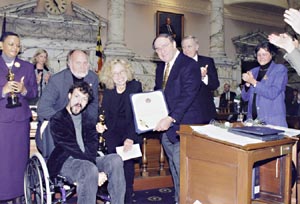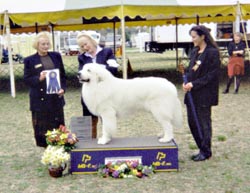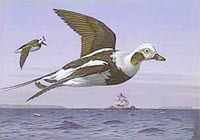| Oscar Visits the Statehouse
What weighs eight pounds, stands about 12 inches tall, can be carried in a satchel but most often is cradled like a baby? Oscar, who with his twin visited the Maryland Statehouse last week in the arms of Susan Hadary and Bill Whiteford. The filmmakers were freshly and victor iously home from the Academy Awards ceremony in Hollywood. iously home from the Academy Awards ceremony in Hollywood.
In case you’ve had spring fever and missed all the hoopla, Hadary and Whiteford, Cape St. Claire residents associated with the University of Maryland School of Medicine, won the Oscar for the best short film for 1999. Fifteen years in the making, the 39-minute documentary follows the life of Dan Keplinger, of Towson, as he grapples with cerebral palsy to graduate from college and achieve standing as an artist. Filmmakers and subject are touring the state with their matching Oscars.
Hadary and Whiteford have been co-producing documentaries since 1980 and have won five Emmys and numerous other awards, including awards from the Corporation for Public Broadcasting, the American Educational Film Festival, and the prestigious Sigma Tau award for best medical broadcast journalism. Still, Hadary says of winning the Oscar that she’s “a bit overwhelmed. We’ve always done private things.”
By the looks of how the filmmakers, Keplinger and the Oscar twins were greeted at Maryland’s General Assembly on April 5, their lives are private no more.
The filmmakers, who visited at the invitation of Del. Dick D’Amato, Annapolis, pulled their Oscars out of black satchels to oooohs and ahhhs all around. The smooth, gold-plated statues were cool and irresistible to the touch. Whoever said all that glitters is not gold must never have witnessed the magic of Hollywood come to Maryland.
Delegates and staff alike clambered to hold an Oscar in their own hands, remarked on its weight and cradled the prize. Del. Virginia Clagett, Anne Arundel County, reminded all to hold the Oscar “with two hands,” prompting her aide, Ann Frye, to note “it’s interesting to see what people’s fantasies are.” That as her own boss wouldn’t (or couldn’t) seem to let go of the Oscar, carrying it to the floor of the House of Delegates for special resolutions congratulating Hadary, Whiteford and Keplinger.
Hadary, who said her knees went weak when she first heard her name announced the night of the Academy Awards, says she doesn’t remember much of anything after that. Whiteford says he just remembers smiling.
Keplinger, 27, of Towson, said his Hollywood experience was “awesome.” He thanked members of the House of Delegates for programs that have helped him attend school and live on his own and for transportation and the personal assistance he receives each day. As delegates gave him a standing ovation, he excitedly responded with flailing arms and the sheer exuberance of his personality.
Keplinger has a personal assistant to feed him his meals, help the independent artist who has won awards for his paintings has no choice about since he cannot control the spasms caused by his cerebral palsy.
The film, King Gimp, shows how difficult Keplinger’s life journey has been. Hadary and Whiteford have followed that life with a camera and with great affection. Their life work has inspired and educated the medical profession, citizens and now legislators about the special needs and talents of people like Keplinger, who live with disabilities every day of their lives. Their teamwork has brought to the screen the profiles of many other “ordinary people who have had exceptional life experiences.”
King Gimp will air on HBO on June 5. During the 2001 General Assembly, Dan Keplinger’s art will be displayed in the Lowe House Office Building.
Crab Study Aims to Deepen Understanding at Bay Bottom
We’re close to mapping the human genome, and we’ve recently deciphered the genetic codes of fruitflies and even rice. Yet we don’t know a great deal about the signature creature of the Chesapeake Bay, the blue crab.
But an amendment tacked on to an appropriation in the General Assembly at the request of Del. Dick D’Amato could begin answering some of the questions we need answered to understand the troubling fluctuations in our crab population.
The $100,000 spending measure will enable the University of Maryland Biotechnology Institute to begin studies on the reproduction of crabs with the goal of improving their stock.
“This is important because we don’t know enough about the life cycle of the crab or the genetics,” said D’Amato, adding that we can’t truly know the cause when crabs are scarce.
D’Amato asked Gov. Parris Glendening to formally request the spending authorization, and Glendening agreed.
It will allow the Biotechnology Institute to hire a research scientist with a background in crab physiology and to pay for international expertise to work on a broodstock management program. About $25,000 of the money will pay for tanks to house the crabs.
D’Amato said he believes the research program can one day lead to programs that will stabilize the Chesapeake Bay crab population.
Among Dogs,
There Are Two Kinds of Champions
photos by Darcey Dodd
Shadrack, left, wouldn’t have made the cut against show dogs like Kendall-Jackson.
“And the Irish wolfhound says, ‘So what! I’ll eat yo u any day,’ said Wesley Copeland of the big dog’s reaction when a great Pyrenees won Best in Show over the tall, shaggy hound last Saturday at Chesapeake Kennel Club’s 28th All-Breed Dog Show and Obedience Trial. u any day,’ said Wesley Copeland of the big dog’s reaction when a great Pyrenees won Best in Show over the tall, shaggy hound last Saturday at Chesapeake Kennel Club’s 28th All-Breed Dog Show and Obedience Trial.
Wesley and his wife Chardell of Holland Point, proud owners of a Bernese mountain dog, watched the day’s events at Calvert County Fairgrounds. “We’re here because we’re animal lovers,” said Copeland.
Browsing the rows and rows of more than 1,100 sporting, hound, working, terrier, toy, non-sporting and herding canines reminded me of the only pooch I’d ever had: Shadrack.
I was seven years old when my mother brought home the dog my father described as “Heinz 57.” He was black and white, short and squat, and his ears flopped.
My friend never had the style and grace of these show dogs.
He frolicked around when we asked him to sit, made sure my mother’s pal never left our house with a dry pant leg and reinvented the meaning of walking the dog. He walked us, of course.
But one thing Shadrack, named by a friend of the family, did have was spunk.
This mutt loved to fish. He was our designated fishing line-watcher, growling whenever there was a bite. He became a big brother to our cat, often playfully wrapping his mouth around the feline’s body, pretending Kitty was his next feast. During the holidays, he happily dressed up like Santa, and he was always first to dash to our front door, wagging his tail vigorously at the mere sound of the words “car ride.”
What a dog!
I sure missed Shadrack as I watched the competitors proudly sit, stay and trot before picky judges and hundreds of viewers.
My dog wouldn’t have made the cut.

Dogs entering obedience trials are judged by how well they perform such exercises as retrieving, jumping, sitting and staying still until their owner instructs them otherwise.
Shadrack? No way.
He wouldn’t have fared much better in conformation judging.
“The conformation judging is, in a way, a beauty contest,” said Chesapeake Kennel Club judge committee chair Ellie Creech. “It’s the way the dog looks and moves. It’s body structure and temperament.”
Each breed has its own standards. “The judges are looking for the ideal specimen,” explained Creech.
Champion Rivergroves Kendall-Jackson — the two-year-old big, fluffy white great Pyrenees that won Best in Show — fit that mold.
This is one more victory to add to Kendall-Jackson’s list. Last year, at just 17 months of age, he was the youngest great Pyrenees to win Best in Show at Baltimore County Kennel Club’s competition.
Since then, owner Jean Boyd, a breeder for 30-plus years, has entered him in dozens of shows. It’s paid off. Kendall-Jackson is the number two great Pyrenees in the country.
What did he win at Saturday’s show? A rosette and a vase. Even better, he won recognition.
“In the world of dogs,” said Wesley Copeland, “that’s a big deal.”
Shadrack wouldn’t have cared.
Bear Essentials …

Two black bears foraging in the wilderness — not in a farmer’s field — won artist Steve Oliver of Brookhaven, Pa., first place honors in Maryland Department of Natural Resource’s 2000 Black Bear Conservation Stamp Contest.
Oliver’s painting becomes this year’s Black Bear Conservation Stamp. The $5 stamp is sold to help reimburse Western Maryland landowners who suffered damage to their property from blitzkrieging black bears. About $7,500 has been paid to agrieved landowners.
Besides the satisaction of justice done, your $5 buys you a miniature work of art.
Art has always been a part of artist Oliver’s life. “As long as I have been able to hold a crayon, I have been drawing,” said Oliver.
Oliver has contributed artwork to the Academy of Natural Sciences in Philadelphia and The Defenders of Wildlife in Washington, D.C. His wildlife designs have also been reproduced on Viva and Scott paper towels.
Purchase a bear stamp from the State Forestry and Tree Nursery: 800/873-3763.
… and Duck Worthy

At opposite ends of the stamp chain, David T. Turnbaugh flew to first place with his entry “Bay Denizen,” an oil painting of two old squaw ducks flying past the Thomas Point Lighthouse.
Turnbaugh himself is no lame duck. He’s won DNR’s annual Duck Stamp Contest four times.
“I am honored to win the Duck Stamp Contest again,” said Turnbaugh. “Not only is this a tremendous honor for me, but the proceeds of the stamp sales help provide much needed protection to the wildlife on the Bay.”
The $6 stamps fund waterfowl research and habitat enhancement on state public lands. Since the contest began in 1975, $3 million has been invested to improve waterfowl migration and wintering habitats.
The stamps are both collectible and practical. Wildfowl hunters must post the duck stamp on their licenses or break the law.
Purchase your duck stamp for home or field where hunting licenses are sold.
Way Downstream …
In Virginia, balky regulators had this reaction to orders to stop harvesting so many horseshoe crabs: They’re ignoring it. The Atlantic States Marine Fisheries Commission ordered Virginia, Maryland, Delaware and New Jersey to cut harvests by 25 percent; it was to be 50 percent until Virginia protested. Saying it doesn’t believe horseshoes are threatened, Virginia plans to let watermen take over ...700,000 horseshoes from the Chesapeake this season for bait …
In San Jose, Calif., Connie Pranger has music in her backyard that would drown out our spring peepers. They’re coming from Pacific tree frogs in her goldfish pond, and they’re making so much mating racket that her neighbors called South Bay Animal Control last month …
In Swaziland, a senator last week had an idea for tourism: Bring in people to look at the country’s devastated environment to see what can happen if you let soil erode. Colleagues protested but then decided that fencing off a few ugly sites might not be a bad idea …
Our Creature Feature comes from Gibraltar where, the Kuala Lumpur Star reports, they’re having a heck of a monkey problem. The Gibraltar Parliament voted last month to impose birth control on the Rock’s apes, hoping to reduce the population on just over two square miles from 300 to 180.
Since 1944, when the population was 16, the apes have been acting like … rabbits. And these are some cunning primates, having learned to break into apartments, gobble snacks and tear down power lines for kicks. No word on what birth control methods will be favored.
Copyright 2000
Bay Weekly
|